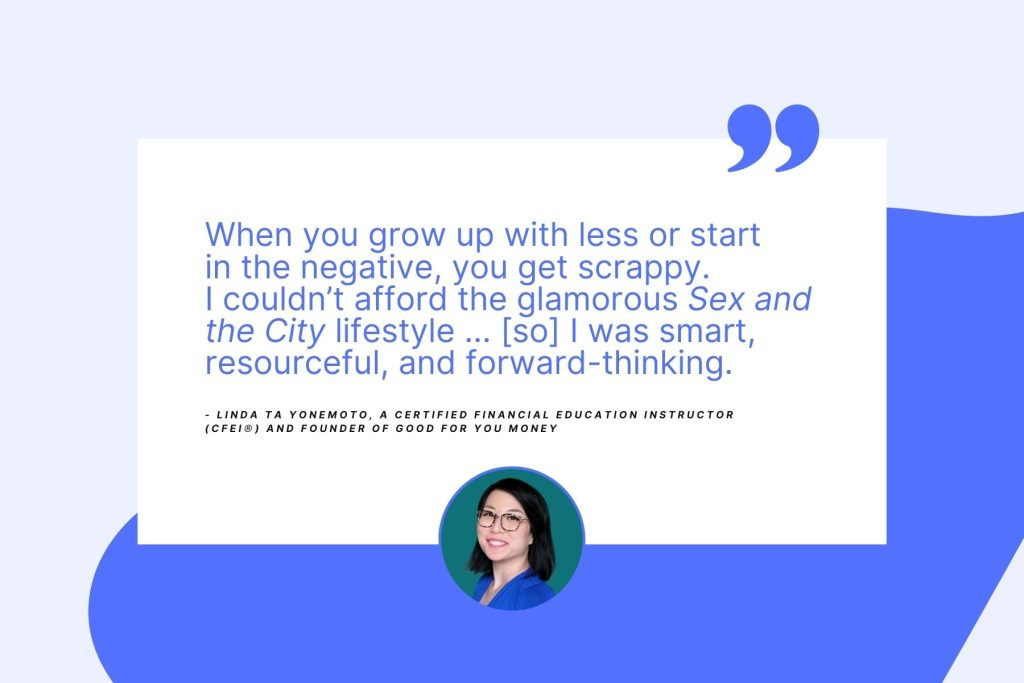House hacking helped this millennial become work-optional by age 36 — here’s how
Though not for everyone, embracing an alternative living setup for a while could help you build wealth, says a financial literacy and FIRE educator.
Even with stable jobs, American millennials and Gen Z are getting priced out of a basic necessity — housing. A family earning $97,800 now needs 38% of its earnings just to cover the mortgage on a median-priced home, according to the National Association of Home Builders. For low-income families, that figure skyrockets to 76% of their income. With so much going toward keeping a roof overhead, many young professionals struggle to invest for retirement, build savings, or pay off debt.
For one millennial, house hacking became a pathway to financial freedom. By sharing a living space throughout her twenties, she slashed her biggest expense to accumulate wealth. This helped her reach work-optional status by age 36 — nearly three decades before the average retirement age of 64.
“Alternative living setups [can] drastically lower essential costs and free up cash flow for bigger goals,” explains Linda Ta Yonemoto, a Certified Financial Education Instructor (CFEI®) and founder of Good For You Money, a resource offering practical financial literacy education. Below, she shares her unconventional journey from college co-op to homeownership and the steps you can take to follow her path to financial independence.
How to house hack, according to a millennial who retired before 40
“With inflation rising, many can’t follow the 50/30/20 or even the 60/20/10 budget formula, [which recommends spending set percentages of income based on needs, wants, and savings] because housing comprises a high portion of essential living costs,” says Yonemoto. “If you house hack, you can often dramatically cut your housing expense, which is usually the biggest cost in your budget.”
House hacking looks different for everyone. Recent graduates might move back home with their families temporarily. Renters often find roommates to split costs. And homeowners might convert part of their properties into rental units.
Yonemoto’s journey started with Berkeley’s Student Cooperative system — a nonprofit network of affordable off-campus housing. Living in a 60-member house, she worked as a chef to offset living expenses. “Compared to friends in off-campus apartments or dorms, I spent less and ate better,” she recalls.
After graduating into the Great Recession, Yonemoto moved home with her partner while working three jobs. Later, in Las Vegas, the couple rented a three-bedroom house with two roommates instead of a small apartment for two. This allowed them to save for a down payment to buy their first home together.
Keen to try house hacking? Here’s how you can make it an effective wealth-building strategy:
Step 1: Know that house hacking isn’t only for homeowners
That’s right — renters can house hack, too. Yonemoto points out that living in a multi-generational family household also counts. The key is finding creative ways to share housing costs.
Author’s perspective: In my sophomore year of college, I converted my apartment’s dining room into a third bedroom. This allowed five people (instead of four) to share a two-bedroom apartment. Each tenant saved about $100 monthly — significant for students then. While not always comfortable, the savings were worthwhile, and I saw firsthand that house hacking works for cash-strapped renters.
Step 2: Establish goals and create a transition plan
Before diving into house hacking, define your financial goals and timeline. Getting these details on paper makes them concrete and sets you up for success.
Yonemoto also recommends setting clear milestones to mark when your house hacking phase will end, such as these targets:
Building a specific savings amount (e.g., $50,000 for a down payment)
Reaching a certain net worth milestone (e.g., $100,000)
Paying off a particular debt (e.g., student loans, credit cards)
Achieving a consistent target passive income level (e.g., $1,000 per month)
Hitting a certain age or life stage (e.g., 30th birthday, marriage, starting a family)
And if you’re house hacking with your partner, take extra time to ensure alignment on the big plan.
Step 3: Choose your housemates carefully
Who you live with can make or break your house hacking experience. While saving money matters, Yonemoto emphasizes character above all. “For me, prior living experience or deep trust is key,” she explains, noting she was fortunate to avoid terrible roommate situations.
Author’s perspective: My worst house hacking experience stemmed from lifestyle clashes with college roommates. Some neglected to clean common areas. Others hosted late weeknight parties. Many helped themselves to others’ food without permission. These frustrations taught me to thoroughly vet housemates. Look for people whose cleaning habits, social patterns, and daily routines match yours. Because no amount of savings is worth it if you dread coming home.
Step 4: Get everyone’s names on the lease
“This [step] protects everyone legally and financially,” Yonemoto stresses. When names are missing from official documents, signed tenants take on all financial risks and legal responsibility for damages, unpaid rent, or broken lease terms.
This protection matters even among friends or romantic partners. Life happens — people move for new jobs, couples break up, and financial situations change. Without their name on the lease, a roommate who leaves has no legal obligation to keep paying — leaving you (and remaining residents) to cover their share. Plus, anyone not on the lease might have no legal standing if issues with the landlord arise.
Step 5: Set expectations early
Clear communication upfront prevents most house hacking headaches. Before move-in day, schedule a detailed conversation about financial responsibilities and house rules.
Discuss rent division, utility payments, guest policies, quiet hours, and even seemingly minor expenses such as cleaning supplies and toilet paper. “If you’re not in agreement with each other, then you won’t be a good fit for shared living arrangements,” Yonemoto cautions.
And don’t rely on verbal agreements. “[Creating] a written roommate agreement may be awkward but [it’s] necessary,” she advises. “[It] makes tough conversations easier later ... you don't want to get into a situation where your roommate forgets what you agreed on weeks ago."
Step 6: Revisit the arrangement often
Yonemoto recommends a minimum of twice-monthly check-ins for honest “is this still worth it?” conversations. “My partner and I would check in weekly and have more serious conversations every time we collected our roommates’ rent checks,” she explains. This practice helps you stay intentional about your living situation.
Author’s perspective: Solo house-hackers benefit equally from regular assessment. After college, I rented a room in a three-bedroom condo where the owner lived in the master bedroom. Months before our lease ended, she shared that she had bought the property to build equity and reach a savings target. Reviewing and sticking to her plan helped her recognize when it was time to sell and move to her next life chapter.
Expert tips for fruitful house hacking
House hacking offers numerous benefits beyond reducing your biggest expense. For example, Yonemoto highlights that you can get a practical introduction to real estate investing without significant upfront capital. A smooth experience requires thoughtful planning, however.
Before sharing your living space, consider these tips:
Screen carefully. “Choose roommates as you’d choose a business partner,” Yonemoto advises. “If something feels off, it’ll only [worsen] after you’ve settled in together and the [initial] politeness fades.”
Budget for turnover. Life changes happen through new relationships, job opportunities, and other transitions. If a roommate moves out without notice, you may need to cover their share until you find a replacement.
Create privacy zones. Work with your roommates to establish areas or times that are your own. Use room dividers, noise-cancelling headphones, or agreed-upon quiet hours to carve out personal space within a shared environment.
Formalize shared purchases and subscriptions. Document who owns what furniture and how you’ll divide costs for streaming services, utilities, and household supplies. Apps like Splitwise can help track shared expenses and prevent misunderstandings.
Enjoy the social benefits. Having housemates can mean pet sitting when you need to travel, and shared meal prep that saves time and money. Establish systems for pooling resources when it benefits everyone.
Set fair market rates, even for friends. Treating house hacking as the financial decision it is prevents uncomfortable situations. “Charging friends less may feel kind. But it can blur boundaries and jeopardize both your finances and the friendship if things go south,” warns Yonemoto.
Prepare for lifestyle trade-offs. Even great roommates can get on your nerves. Know your limits and remember your financial goals when facing minor annoyances.
Address issues early. Don’t let problems grow into resentment. Timely discussions prevent unnecessary stress and screaming matches.
The bottom line
House hacking can be life-changing when done right. “It reduced and [even] eliminated [my] housing costs for a while,” Yonemoto notes. “[That] gave me space to max out my 401(k), Roth IRA, HSA, and after-tax brokerage contributions.” Yonemoto’s disciplined saving and investing created the foundation for financial independence and early retirement in her mid-thirties.
Looking back, Yonemoto has no regrets about her earlier housing choices. “These days, my partner and I have the whole place to ourselves, and I’m glad we made sacrifices in our earlier years,” she reflects. And the sacrifices didn’t only pay off for Yonemoto. Her former roommates have since invested in their properties as well.
On the fence? Yonemoto suggests trying it as a short-term experiment. “If it doesn’t work out, you can always go back to the standard arrangement society normalizes,” she says. “[But] you might be surprised by how much freedom and progress a shared housing setup can unlock for you.”
Enjoying Wavecomber and want to support my work? You’d make my day with a Pink Drink.
Note: This story was originally published on https://wavecomber.com/house-hacking-helped-this-millennial-become-work-optional-by-age-36/.
Sources:
1. Berkeley Student Cooperative System, “Affordable, cooperative student housing.” Accessed 27 Apr 2025.
2. Lafayette Federal Credit Union, “The Financial Independence, Retire Early (FIRE) movement: A guide for Xers, millennials, and zoomers.” Accessed 27 Apr 2025.
3. National Association of Home Builders, "Families must spend 38% of their income on mortgage payments." Accessed 27 Apr 2025.
4. U.S. Department of the Treasury, “Rent, house prices, and demographics.” Accessed 27 Apr 2025.
5. United States Census Bureau, “Nearly half of renter households are cost-burdened, proportions differ by race.” Accessed 27 Apr 2025.
6. United States Census Bureau, “Working beyond retirement age.” Accessed 27 Apr 2025.










This is SO interesting! I wouldn't have thought of how powerful this could be, but darn the magic of 'house hacking' + compounding over years! 😆✨
Truly, I am so grateful that you shared this perspective because many would never have heard such a technique, but this could be a great solution for them to consider as they look at their lifestyles, as well as ways to divide or "share" expenses.
Awesome! Lower your living costs, get properties, expand your earning potential, don't expand your cost of living, buy more stocks and properties, eventually win.